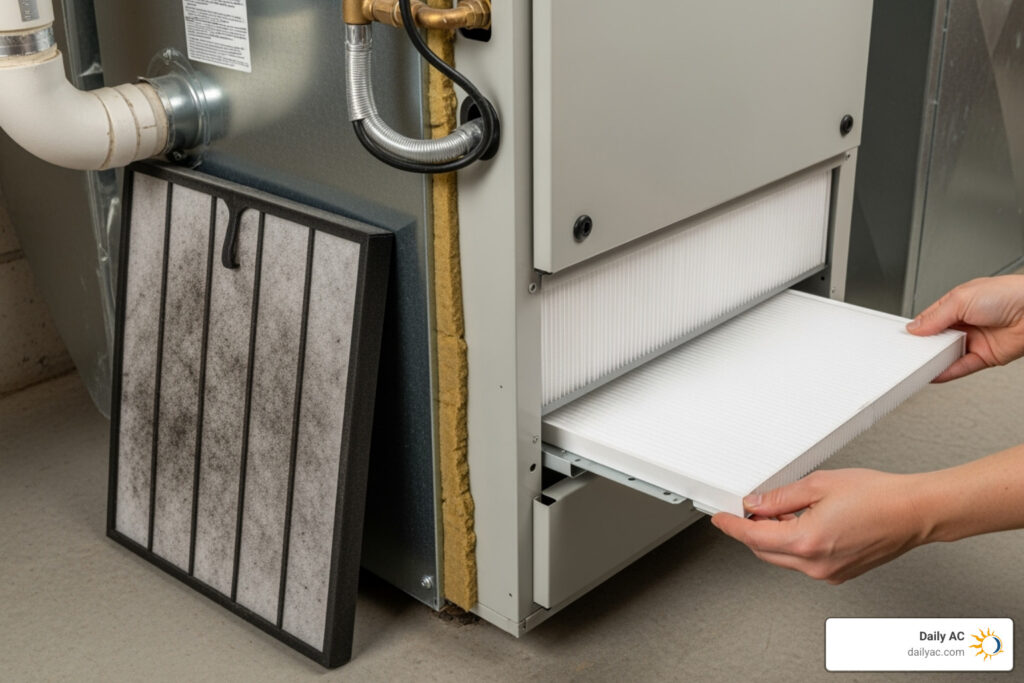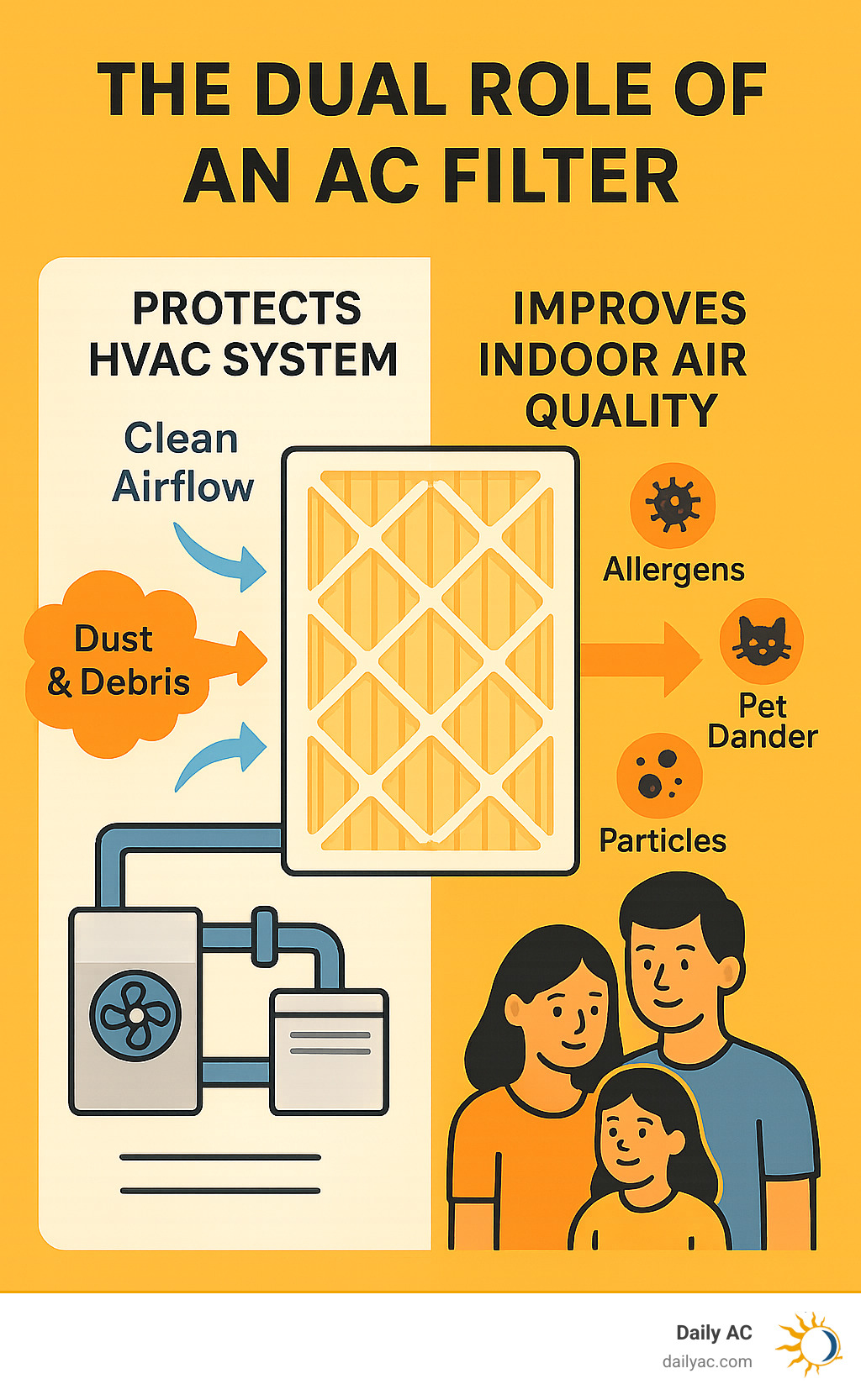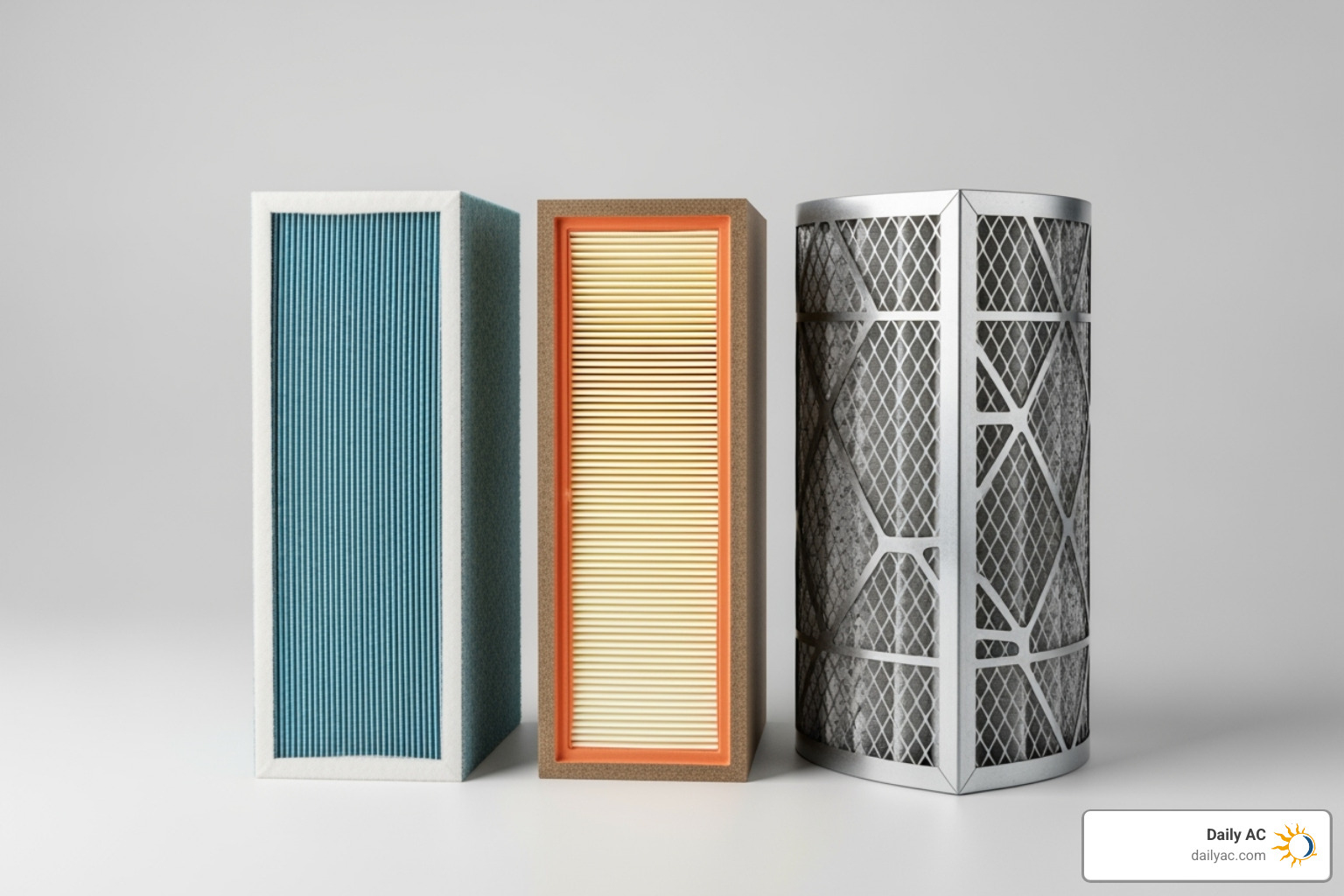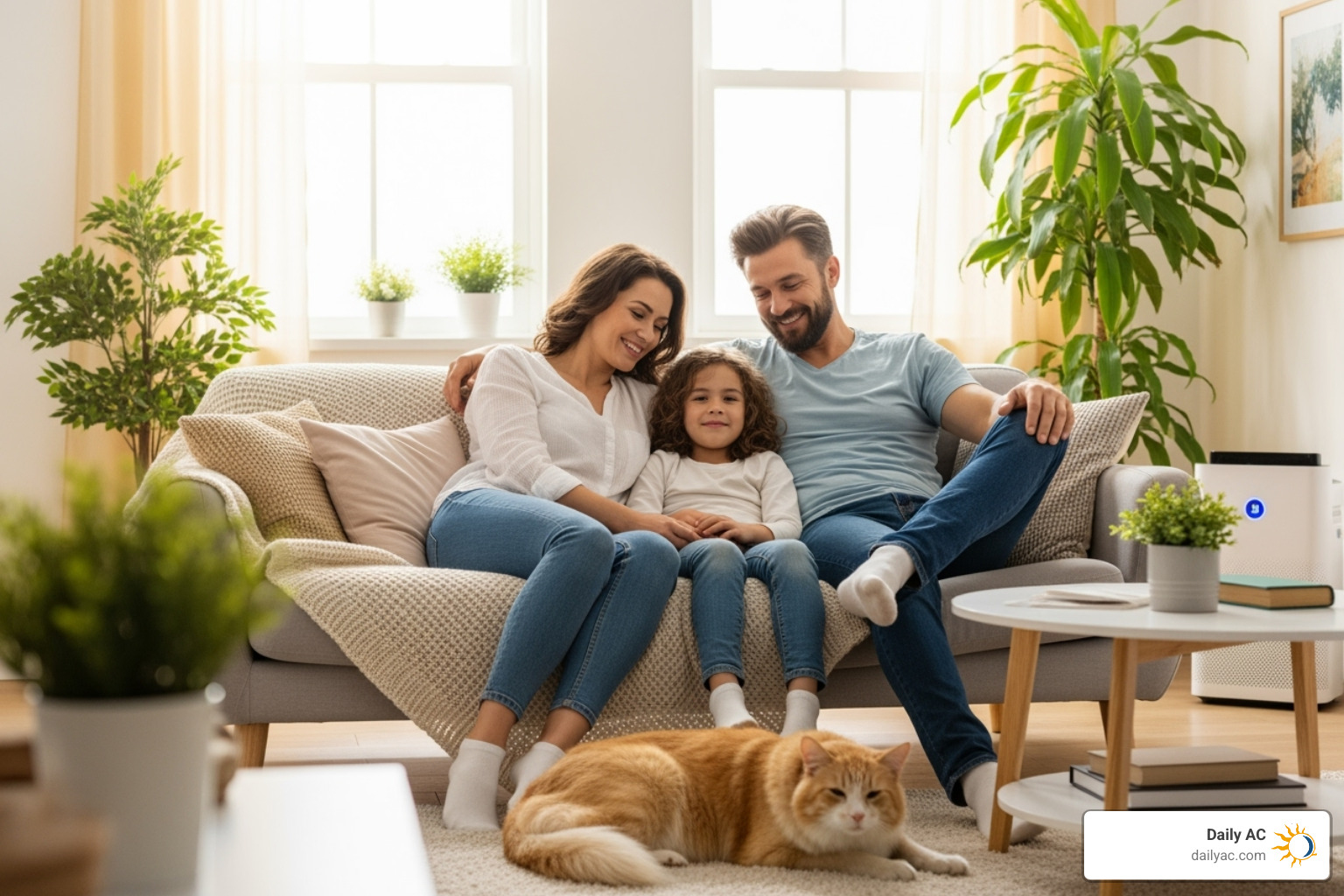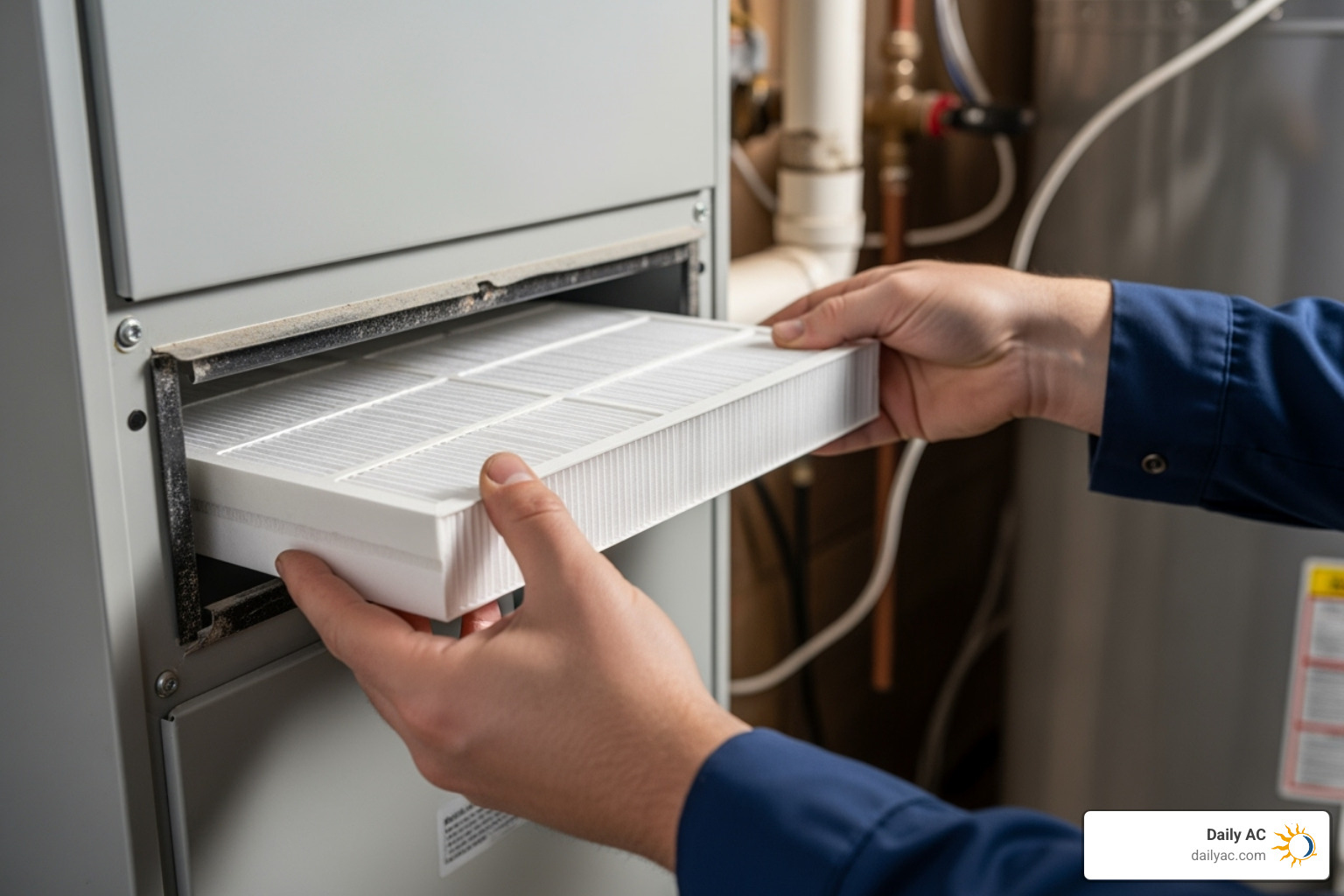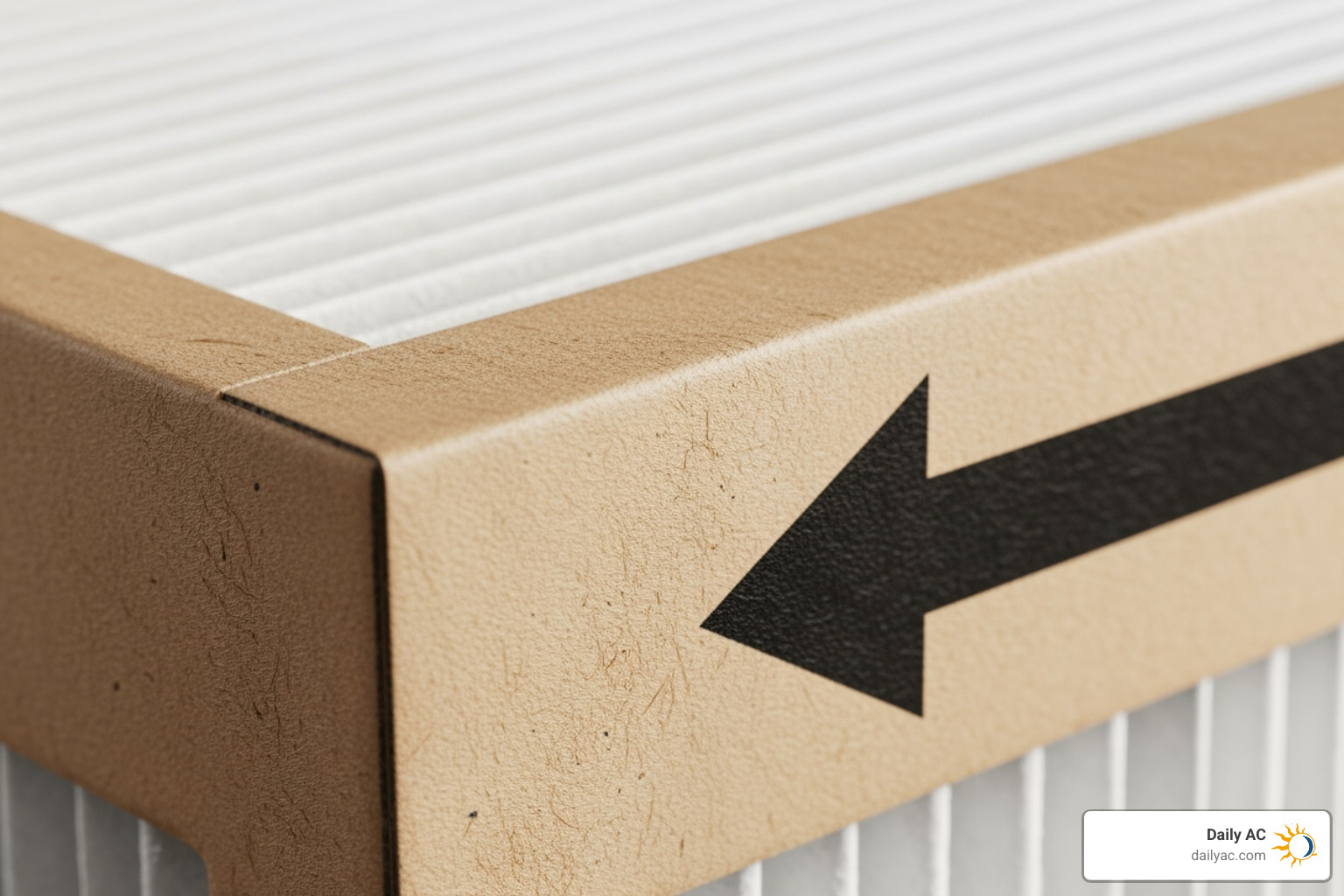Why Your AC Filter is Your Home’s Unsung Hero
AC filter replacement is a small task with a big impact on your home’s comfort and your wallet. This simple component works double duty, protecting your HVAC equipment from damaging dust and debris while simultaneously cleaning the air your family breathes.
Depending on the type, filters need regular changes: basic fiberglass filters monthly, pleated filters every 90 days, and high-efficiency filters sometimes monthly as they trap more dirt. A dirty, clogged filter forces your system to work much harder, which can increase energy bills by up to 15%, reduce cooling power, and lead to expensive repairs.
The good news? Filter replacement is one of the easiest DIY home maintenance tasks. It takes just a few minutes with no special tools. Maintaining a clean filter directly impacts your indoor air quality (IAQ) and is a cost-effective way to protect your HVAC investment. As experts in HVAC services across Davie, Plantation, and Miramar, FL, we at Daily AC understand this crucial link between a clean filter and a healthy, comfortable home. To learn more, check out our guide on the Importance of IAQ in Properties.
Decoding AC Filters: Types, Materials, and Ratings
Walking down the filter aisle can feel overwhelming, but understanding your choices for AC filter replacement makes it simple. Most filters you’ll find are disposable filters designed for single use.
- Fiberglass filters are the budget-friendly choice for basic protection. They catch large particles like lint and dust and should be changed monthly (MERV 1-4).
- Pleated filters offer a significant upgrade. Their folded design provides more surface area to trap smaller particles like pollen, pet dander, and mold spores. They typically last up to 90 days (MERV 5-13).
- Activated carbon filters are pleated filters with an added layer of carbon to control odors from pets, smoke, or cooking.
Washable filters, also called reusable filters, are an eco-friendly option that can save money over time. They have a sturdy frame and synthetic media that you can rinse clean. However, they must be cleaned diligently and dried completely to prevent mold growth. Electrostatic filters use a static charge to attract particles and are available in both disposable and washable versions.
What Do MERV Ratings Mean?
MERV stands for Minimum Efficiency Reporting Values. As the EPA explains, it’s a standardized scale from 1 to 16 that rates a filter’s ability to capture tiny particles.
A higher MERV rating means the filter can trap smaller particles. However, higher isn’t always better. A filter with a very high MERV rating can be too dense, restricting airflow and forcing your HVAC system to work harder than it should. The goal is to find a balance between filtration and airflow.
| MERV Rating Range | Best For | What They Capture |
|---|---|---|
| MERV 1-4 | Basic protection, window units | Pollen, dust mites, lint, larger pet dander |
| MERV 5-8 | Most homes, good balance | Mold spores, finer dust, hair spray particles |
| MERV 9-12 | Allergy sufferers, superior filtration | Fine dust, smaller mold spores, auto emissions |
| MERV 13-16 | High-end residential, medical needs | Bacteria, cooking oil, tobacco smoke, some viruses |
For most Florida homes in areas like Davie, Plantation, and Miramar, a MERV 8-13 filter provides excellent protection against common allergens without straining the system. Airflow restriction is as important as filtration power, as a filter that’s too restrictive can increase energy bills and damage your system.
Choosing the Perfect Filter for Your Florida Home
Living in Florida means dealing with year-round humidity and allergens. Choosing the right AC filter is about creating a healthy environment for your family while protecting your HVAC system.
When selecting a filter, consider your household needs (allergies, pets), your budget, and, most importantly, your HVAC system compatibility. Using a filter your system wasn’t designed for can lead to costly problems. At Daily AC, we help families in Davie, Plantation, and Miramar find the right balance. If you’re curious about more advanced solutions, see Why You Should Consider Air Quality Services.
Best Filters for Allergies and Pets
If you’re dealing with pet dander, pollen, or mold spores, the right filter can be a game-changer. For allergy sufferers and pet owners, we recommend filters with MERV 11 to MERV 13 ratings. These are highly effective at trapping common irritants. A MERV 11 filter captures most pet dander and pollen, while a MERV 13 filter can trap even smaller particles like bacteria.
These high-efficiency filters get dirty faster because they work so well. This may require more frequent AC filter replacement, especially during high-pollen seasons or if you have multiple pets. Some filters also include activated carbon to neutralize odors. According to the National Institute of Environmental Health Sciences, a quality filter is your first line of defense against airborne pet allergens. For more options, explore our Air Filtration Media & Air Cleaners Davie, FL services.
Balancing Filtration and Airflow
It’s tempting to buy the filter with the highest MERV rating, but this can be a mistake. Your HVAC system is designed for a specific level of airflow. A filter that is too restrictive makes the blower motor work overtime.
This system strain can cause premature wear on components, leading to early failure. Your energy consumption will also increase as the system runs longer to cool your home. In extreme cases, restricted airflow can cause the evaporator coil to freeze, leading to a system shutdown and potential water damage.
Always check your manufacturer recommendations for the maximum MERV rating your system can handle. Most residential systems perform best with MERV 8 to 11 filters. Finding the right balance cleans your air without strangling your system. Regular maintenance, as discussed in our guide on the 5 Benefits of an AC Tune-Up, ensures everything works together properly.
Your Step-by-Step Guide to AC Filter Replacement
Ready to tackle your first AC filter replacement? It’s one of the easiest home maintenance tasks you can do.
First, safety is key. Turn your thermostat completely off. For extra protection, flip the circuit breaker that powers your air handler or furnace.
Next, locate the filter slot. It’s typically in one of two places:
- At the air handler (the indoor unit), where the large return duct connects. Look for a slot with a small cover.
- In a return air duct behind a large grille on a wall or ceiling in a central area of your home.
Once you’ve done it once, you’ll see how straightforward it is.
How to Find the Right Size and Install It Correctly
Using the right size filter is crucial. A filter that’s too small will let dirty air bypass it, and one that’s too large won’t fit.
Check your existing filter for the dimensions printed on its cardboard frame (e.g., “20x25x1”). If the numbers are gone, use a measuring tape to measure the old filter or the slot itself.
Pay close attention to the airflow arrow on the new filter’s frame. This arrow must point toward your furnace or air handler (the main unit). This ensures debris is caught before it reaches your system’s sensitive components.
When you remove the old filter, it will likely be dirty—a sign it did its job. Slide the new filter in, making sure the arrow points the right way and the fit is snug with no gaps. Close the cover, restore power, and you’re done! You’ve just completed your first AC filter replacement.
The Payoffs of Punctuality: Benefits and Replacement Schedules
Staying on top of AC filter replacement is a smart investment that pays off in comfort, savings, and system health. The benefits are significant:
- Lower Energy Bills: A clean filter allows your system to “breathe” easily, reducing strain and lowering energy consumption by up to 15%.
- Improved System Performance: You’ll enjoy stronger airflow and more consistent temperatures throughout your home.
- Extended HVAC Lifespan: By preventing strain on critical components, you reduce the risk of costly repairs and help your system last longer.
- Better Indoor Air Quality: A clean filter traps dust, pollen, and pet dander, leading to less dust and relief for allergy sufferers.
These benefits show why regular filter changes are one of the most cost-effective maintenance tasks. Learn more about protecting your investment in our guide on the Importance of Regular AC Maintenance.
How Often Do I Need an AC Filter Replacement?
The “every 30 to 90 days” rule is just a starting point. Your ideal schedule depends on several factors:
- Filter Type: Basic 1-inch fiberglass filters need monthly changes, while pleated 1-inch filters can last up to 90 days. Thicker 4- or 5-inch filters may last 6 months.
- Household Situation: Homes with pets or smokers require more frequent changes, sometimes monthly or even bi-weekly.
- Environment: High pollen seasons, nearby construction, or poor local air quality will clog a filter faster.
- System Usage: During long, hot Florida summers when your AC runs constantly, your filter will need changing more often.
The best practice is to check your filter monthly. If it looks dirty, it’s time for an AC filter replacement, regardless of the schedule.
Signs You Need an AC Filter Replacement
Your HVAC system will give you clues when it’s time for a change. Look for these signs:
- Visible Dirt: If you can’t see light through the filter, it’s clogged.
- Increased Dust: More dust accumulating on surfaces around your home.
- Reduced Airflow: The air coming from your vents feels weaker than usual.
- Rising Utility Bills: An unexplained increase in energy costs can point to a dirty filter.
- System Short Cycling: The AC turns on and off frequently without fully cooling the house.
- Unpleasant Odors: A dirty, damp filter can become a source of musty smells.
- Increased Allergy Symptoms: A decline in air quality can trigger symptoms in sensitive family members.
Don’t wait for these warning signs. Proactive replacement is key, which is why we always stress Why is AC Maintenance So Important? to our clients.
Frequently Asked Questions about AC Filters
We get plenty of questions about filters from homeowners in South Florida. Here are answers to the most common ones.
What happens if I don’t change my AC filter?
Skipping AC filter replacement forces your HVAC system to work much harder to pull air through a clogged filter. This strain leads to several problems: higher energy bills (up to 15% or more), reduced cooling performance, and premature wear on critical components. In severe cases, it can cause the system’s evaporator coil to freeze, leading to a complete shutdown and expensive repairs. All the dust and debris the filter should have caught will also circulate back into your home’s air.
Can I clean a disposable filter instead of replacing it?
No. Disposable filters are designed for single use only. Attempting to wash them damages the delicate filter media, creating gaps that let dirt pass through. Worse, if a washed filter isn’t completely dry before being reinstalled, it can become a breeding ground for mold and mildew inside your HVAC system. Only filters specifically labeled as “washable” or “reusable” should ever be cleaned.
Does a more expensive filter mean it’s better?
Not necessarily. The “best” filter is one that balances your air quality needs with your HVAC system’s capabilities. While expensive, high-MERV filters offer superior filtration, they also restrict airflow more. Installing a filter that’s too restrictive for your system can strain the blower motor, reduce efficiency, and lead to damage. For most Florida homes, a pleated filter with a MERV rating between 8 and 11 provides an excellent balance of clean air and healthy system operation.
Conclusion: Breathe Easier with the Right Maintenance
Regular AC filter replacement is a simple, powerful maintenance task. For just a few minutes of your time, you protect your HVAC system, improve your family’s health, and save money on energy bills. It’s one of the best returns on investment for any homeowner.
We’ve covered the types of filters, what MERV ratings mean, and how to choose the right one for your Florida home. A clean filter allows your system to operate efficiently, ensuring optimal airflow, lower costs, and fewer unexpected breakdowns.
While changing a filter is an easy DIY job, your HVAC system needs comprehensive care to perform at its best. That’s where professional maintenance comes in. The team at Daily AC serves communities like Davie, Plantation, and Miramar, and we understand the unique challenges of our climate.
When you’re ready to ensure your system is in peak condition, consider our professional AC Maintenance Services in Fort Lauderdale, FL. Our experienced technicians provide everything from tune-ups to helping you select the perfect filtration solutions. We’re committed to keeping your home comfortable year-round. Contact Daily AC today and let’s make sure your home breathes easy!





